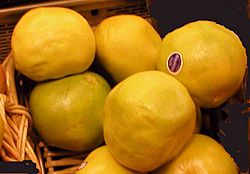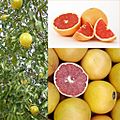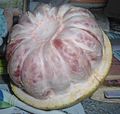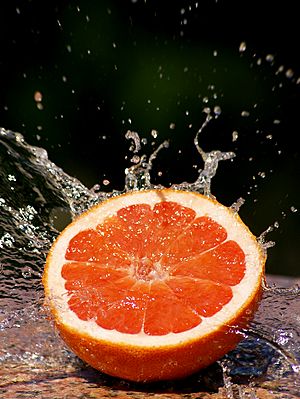Grapefruit facts for kids
Quick facts for kids Grapefruit |
|
|---|---|
 |
|
| A basket of grapefruit | |
| Scientific classification | |
| Kingdom: | |
| Division: | |
| Class: | |
| Subclass: | |
| Order: | |
| Family: | |
| Genus: | |
| Species: |
C. paradisi
|
| Binomial name | |
| Citrus paradisi Macfad.
|
|
The grapefruit is a tasty citrus fruit that grows in warm, sub-tropical regions around the world. It's usually larger than an orange. While some grapefruits can be quite sour, many types offer a variety of sweet or slightly bitter flavors.
Grapefruit trees typically grow to be about 5 to 6 meters (16-20 feet) tall. Some can even reach an impressive 15 meters (nearly 50 feet)! These trees have dark green leaves, up to 150mm (6 inches) long, and beautiful white flowers about 5cm (2 inches) in size. The fruit itself can grow to be 10-15cm (4-6 inches) across. In 2007, over 5 million tons of grapefruits were grown worldwide, with a large amount coming from the United States.
You can find many different kinds of grapefruits. They come in various colors, like red, white, and pink. Each color often has its own unique taste, from very tart to wonderfully sweet.
Types of Grapefruit
There are many interesting types of grapefruit. Some popular ones grown in places like Texas and Florida include:
- Oro Blanco
- Ruby Red
- Pink
- Thompson
- White Marsh
- Flame
- Star Ruby
- Duncan
- Pummelo HB
Health Benefits of Grapefruit
Grapefruit is packed with good things for your body! It's an excellent source of vitamin C, which helps keep you healthy. It also contains fiber called pectin, which is good for your digestion.
The pink and red grapefruits get their color from a special antioxidant called lycopene. Antioxidants are like tiny superheroes that protect your body's cells. Some studies suggest that grapefruit might help lower cholesterol, a type of fat in your blood. There's also evidence that grapefruit seeds have their own helpful antioxidant properties.
You might have heard of the "grapefruit diet." This idea suggests that grapefruit's low glycemic index (meaning it doesn't cause a quick spike in blood sugar) can help your body's metabolism (how your body turns food into energy) burn fat more effectively.
Images for kids
See also
 In Spanish: Pomelo para niños
In Spanish: Pomelo para niños
 | Delilah Pierce |
 | Gordon Parks |
 | Augusta Savage |
 | Charles Ethan Porter |










